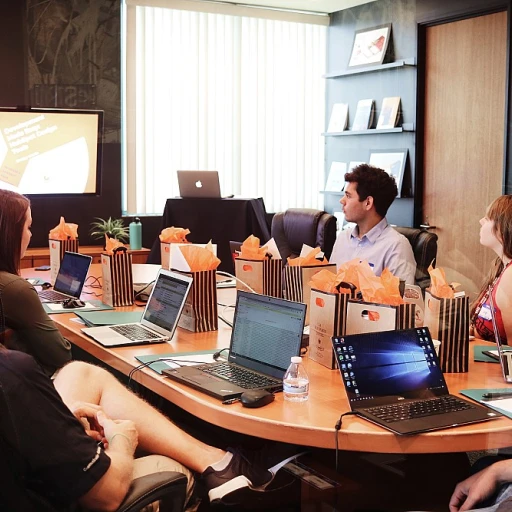The Rise of AI in Recruitment
The Evolution of Technology in Recruitment
The recruitment landscape is undergoing a transformative period, spearheaded by the integration of artificial intelligence into various aspects of hiring processes. As companies strive to find the perfect fit for their roles, AI is stepping up as a pivotal player, reshaping traditional recruitment strategies and paving the way for a more efficient and effective approach to hiring.
AI in recruitment is not just a trend; it's becoming an indispensable part of how organizations identify, attract, and onboard talent. The data-driven capabilities of AI have streamlined candidate sourcing, predictive analytics, and even the assessment phases, enabling HR professionals to make more informed decisions and reduce bias.
In this era, where competition for top talent is fiercer than ever, enhancing the candidate experience while ensuring efficiency and accuracy in the process is critical. AI tools are making a significant impact by providing personalized communication and rapid responses, which translates into a more engaging candidate journey.
While the rise of AI offers incredible potential, it also presents unique challenges that organizations must navigate to fully harness its capabilities. Addressing concerns around data privacy and the ethical use of AI in decision-making are crucial steps to ensure that the benefits of these technologies are maximized.
For a more detailed exploration of how AI is transforming the hiring process, you can read about it
here. Understanding these innovations and their implications prepares organizations for a future where AI plays a central role in human resources.
Enhancing Candidate Experience with AI
Personalized Interaction with Candidates
Artificial intelligence is not just streamlining the recruitment process for employers; it is also enhancing the experience for candidates, making their job search more engaging and personalized. AI-driven platforms can tailor communication based on the candidate's profile, ensuring relevant and timely updates that keep job seekers informed and engaged throughout the recruitment journey.
A significant advantage of AI in this context is its capability in automating interactions via chatbots and virtual assistants. These tools are now sophisticated enough to answer frequently asked questions, schedule interviews, and provide feedback to candidates in real-time, ensuring a seamless communication experience that reduces anxiety and improves satisfaction.
Efficient Screening and Assessments
Another critical touchpoint where artificial intelligence significantly enhances the candidate experience is during the screening and assessment phase of recruitment. Traditional methods of sifting through resumes and conducting assessments can be time-consuming and potentially biased. AI can streamline these processes by employing machine learning algorithms to evaluate qualifications and fit, providing a more objective assessment of each candidate.
Candidates benefit from this streamlined approach as well, as AI can quickly identify their unique strengths and qualifications, matching them to roles they are more suited for without unnecessary delay. This efficiency not only accelerates the hiring process but also demonstrates an organization's commitment to an unbiased and tech-savvy recruitment method.
Harnessing AI for Tailored Candidate Journeys
Artificial intelligence is transforming the recruitment landscape by offering candidates a more personalized and engaging experience. From targeted communication and real-time feedback to efficient assessment methods, AI enhances every stage of the candidate journey. By integrating such technologies, organizations not only attract top talent but also ensure a positive impression that aligns with modern expectations for innovation and responsiveness in hiring practices.
Cutting-edge AI Tools: A New Era in Talent Acquisition
In the rapidly evolving world of talent acquisition, the integration of cutting-edge AI tools has been nothing short of transformative. As organizations strive to streamline their recruitment processes, AI-powered solutions are stepping in to automate and enhance various stages of hiring, making it efficient and data-driven while maintaining a human touch.
One notable development is the use of AI in sourcing candidates. By leveraging machine learning algorithms, these tools can scan vast databases and social media platforms to identify potential candidates who match specific job requirements. This has dramatically reduced the time recruiters spend on manual resume screening, enabling them to focus on more strategic tasks. Furthermore, AI tools are progressively refining the accuracy of employee matching, ensuring that the candidates shortlisted are not only qualified but also a cultural fit for the organization.
AI also plays a significant role in streamlining candidate engagement through chatbots and virtual assistants, which can handle initial inquiries and provide prompt responses to frequently asked questions. This not only enhances the candidate experience but also ensures that talented individuals are not left waiting in the dark during the application process.
Moreover, AI tools are proving invaluable in eliminating unconscious bias from recruitment decisions. By analyzing data and evaluating candidates based on objective criteria, these tools help ensure a fair and equitable hiring process, increasing the diversity of talent pools.
As these AI tools continue to revolutionize the hiring landscape, organizations are tasked with harmonizing AI capabilities with human judgment to make informed and inclusive hiring decisions. For more insights into how AI is reshaping talent acquisition landscapes, check out this
in-depth article.
Data-Driven Decision Making in HiringThe Power of Data in Recruitment
In today's tech-driven world, the integration of artificial intelligence into recruitment processes has become a critical evolution. One of the most transformative aspects of this integration is the data-driven decision making that AI facilitates in hiring. By optimizing how data is gathered, analyzed, and applied, AI significantly enhances the recruitment landscape, enabling more informed and efficient hiring decisions.
AI algorithms are capable of analyzing vast amounts of data quickly and accurately. This ability allows recruiters to identify trends and patterns that may not be immediately apparent through traditional analysis methods. For instance, AI can sift through numerous resumes, identifying the most relevant skills and experiences that align with job requirements, ensuring a more targeted and effective recruitment process.
Moreover, AI-driven data insights help eliminate unconscious bias in hiring. By focusing on objective data points rather than subjective opinions, organizations can create a more diverse and inclusive workforce. AI tools provide recruiters with candidate recommendations based on qualifications and experience, not on personal characteristics, reducing the likelihood of biased decisions.
The efficiency gains from utilizing AI in data processing are immense. Not only does it save hours of manual data handling for HR professionals, but it also reduces time-to-hire, leading to cost savings and better candidate experiences. This efficiency is not limited to large corporations but can also be a game-changer for small and medium-sized enterprises aiming to stay competitive.
However, the shift to AI-driven recruitment is not without its challenges. Implementing AI systems requires careful consideration of data privacy and ethical concerns, as well as integrating these tools seamlessly with existing HR processes. As the technology continues to evolve, organizations must remain vigilant, continuously auditing and refining their AI strategies to ensure they are not only efficient but also ethical and fair.
As we've seen in other parts of this exploration, AI presents unparalleled opportunities in recruitment, from enhancing candidate experiences to revolutionizing talent acquisition. By anchoring decision-making processes in data, organizations can undeniably improve the quality and speed of their hiring practices, setting a solid foundation for future advances in the realm of human resources.Overcoming Challenges in AI-Driven RecruitmentAddressing the Ethical Concerns in AI Recruitment
As artificial intelligence continues to evolve in recruitment, it brings along its own set of challenges, particularly on the ethical front. While AI offers significant advantages, ranging from a streamlined candidate experience to data-driven hiring decisions, it is crucial to tread carefully to ensure fairness and transparency.
One of the core challenges is overcoming inherent biases in AI-driven systems. Algorithms, like their human creators, can harbor biases if not adequately monitored and audited. This raises the question of how to ensure that AI-powered tools do not perpetuate existing inequalities within the hiring process.
Moreover, data privacy remains a major concern. The requirement for large datasets to feed AI systems means companies must strike a balance between collecting valuable insights and safeguarding candidates' personal information. Employers need to be transparent about data usage and ensure compliance with privacy regulations to maintain trust with candidates.
Additionally, the lack of human oversight in AI processes can lead to employment decisions that are unfair or lack empathy. Human Resources professionals must work alongside AI tools, ensuring an element of human judgment to weigh in on final hiring decisions.
Despite these challenges, with proper checks and balances, AI can be a game-changer in recruitment. By focusing on human-AI collaboration, organizations can harness the benefits of AI while proactively addressing its challenges, ensuring a fair and equitable hiring landscape for all.Future of AI in Human ResourcesAnticipating Future Trends in AI for Human Resources
As AI continues to evolve at a rapid pace, its influence on human resources is set to expand, bringing with it new opportunities and challenges. Businesses and HR professionals must stay vigilant and adaptable to harness the full potential of AI in recruitment and beyond.
One key trend to watch is the increasing integration of AI with other emerging technologies, such as blockchain and the Internet of Things (IoT). This convergence is poised to create secure, efficient, and transparent recruitment processes, potentially transforming how talent is sourced and managed.
Moreover, AI-driven recruitment tools are likely to become more personalized, offering tailored candidate experiences that meet the unique needs of both the employer and the job seeker. As mentioned in our earlier discussion on enhancing candidate experience, the application of AI in customizing interactions can significantly contribute to building stronger employer brands and increasing job offer acceptance rates.
However, the future is not without its hurdles. Implementing AI in a responsible and ethical manner remains a paramount concern. Ensuring unbiased decision-making, maintaining data privacy, and addressing legal implications will require ongoing attention and innovation.
Looking forward, AI's role in human resources will undoubtedly expand beyond recruitment to encompass training, retention, and even organizational culture development. By staying informed and agile, HR professionals can effectively leverage AI to meet future workforce demands, setting the stage for a new era in workplace dynamics.








